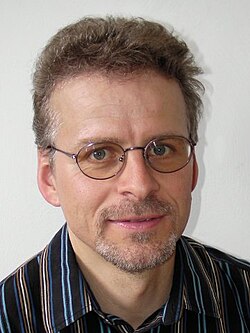Biography:Marcus Hutter
Marcus Hutter | |
|---|---|
 | |
| Nationality | German |
| Alma mater | Technical University Munich and Ludwig Maximilian University of Munich |
| Known for | Universal artificial intelligence Artificial General Intelligence |
| Awards | IJCAI 2023 Alignment 2018 AGI 2016 UAI 2016 IJCAI-JAIR 2014 Kurzweil AGI 2009 Lindley 2006 Best Paper Prizes |
| Scientific career | |
| Fields |
|
| Institutions | DeepMind, Google, IDSIA, ANU, BrainLAB |
| Thesis | Instantons in QCD (1996) |
| Doctoral advisor | Harald Fritzsch |
| Other academic advisors | Wilfried Brauer |
| Doctoral students | Shane Legg and Jan Leike and Tor Lattimore |
| Website | www |
Marcus Hutter (born April 14, 1967 in Munich) is a professor and artificial intelligence researcher. A Senior Scientist at DeepMind, he is researching the mathematical foundations of artificial general intelligence.[1] He is on leave from his professorship at the ANU College of Engineering and Computer Science of the Australian National University in Canberra, Australia.[2] Hutter studied physics and computer science at the Technical University of Munich. In 2000 he joined Jürgen Schmidhuber's group at the Istituto Dalle Molle di Studi sull'Intelligenza Artificiale (Dalle Molle Institute for Artificial Intelligence Research) in Manno, Switzerland.[citation needed] He developed a mathematical theory of artificial general intelligence. His book Universal Artificial Intelligence: Sequential Decisions Based on Algorithmic Probability was published by Springer in 2005.[3]
Research
Starting in 2000, Hutter developed and published a mathematical theory of artificial general intelligence, AIXI, based on idealised intelligent agents and reward-motivated reinforcement learning.[4][5]:399
In 2005, Hutter and Legg published an intelligence test for artificial intelligence devices.[6]
In 2009, Hutter developed and published the theory of feature reinforcement learning.[7]
In 2014, Lattimore and Hutter published an asymptotically optimal extension of the AIXI agent.[8]
Hutter Prize
In 2006, Hutter announced the Hutter Prize for Lossless Compression of Human Knowledge, with a total of €50,000 in prize money.[9] In 2020, Hutter raised the prize money for the Hutter Prize to €500,000.[10]
See also
- Solomonoff induction
Published works
- Marcus Hutter (2002). "The Fastest and Shortest Algorithm for All Well-Defined Problems". International Journal of Foundations of Computer Science (World Scientific) 13 (3): 431–443. doi:10.1142/S0129054102001199. Bibcode: 2002cs........6022H. http://www.hutter1.net/ai/pfastprg.htm.
- Marcus Hutter (2005). Universal Artificial Intelligence: Sequential Decisions Based on Algorithmic Probability. Springer. ISBN 9783540221395. https://books.google.com/books?id=NP53iZGt4KUC.
- Joel Veness, Kee Siong Ng, Marcus Hutter, William Uther and David Silver (2011). "A Monte-Carlo AIXI Approximation". Journal of Artificial Intelligence Research (AAAI Press) 40: 95–142. doi:10.1613/jair.3125.
References
- ↑ [1]. DeepMind. Accessed February 2019.
- ↑ [2]. The Australian National University, Canberra. Accessed December 2016.
- ↑ Marcus Hutter (2005). Universal Artificial Intelligence: Sequential Decisions Based on Algorithmic Probability. Berlin; Heidelberg; New York: Springer. ISBN:9783540221395.
- ↑ Marcus Hutter (2002). "The Fastest and Shortest Algorithm for All Well-Defined Problems". International Journal of Foundations of Computer Science 13 (3): 431–443. doi:10.1142/S0129054102001199. Bibcode: 2002cs........6022H.
- ↑ Bill Hibbard (2008). Adversarial Sequence Prediction. In: Pei Wang (editor) (2008). Artificial General Intelligence, 2008: Proceedings of the First AGI Conference. IOS Press. ISBN:9781586038335. Pages 399–403
- ↑ Duncan Graham-Rowe (12 August 2005). IQ test for AI devices gets experts thinking. New Scientist.
- ↑ Marcus Hutter (2009). "Feature Reinforcement Learning: Part {I}: Unstructured {MDP}s". Journal of Artificial General Intelligence. ISSN 1946-0163. http://www.hutter1.net/ai/phimdpx.pdf.
- ↑ Tor Lattimore and Marcus Hutter (2014). "Algorithmic Learning Theory". Proc. 25th International Conf. on Algorithmic Learning Theory ({ALT'14}). 8776. pp. 170–184. doi:10.1007/978-3-319-11662-4_13. ISBN 978-3-319-11661-7.
- ↑ Marcus Hutter. "50'000€ Prize for Compressing Human Knowledge". hutter1.net. http://prize.hutter1.net.
- ↑ Marcus Hutter. "500'000€ Prize for Compressing Human Knowledge". hutter1.net. http://prize.hutter1.net.
 |

